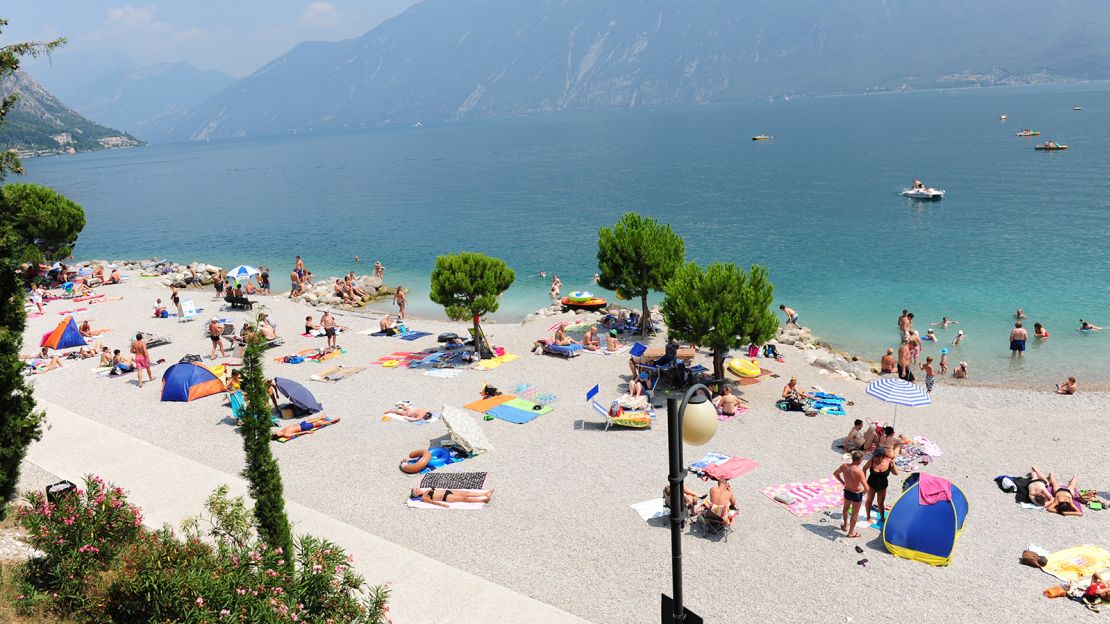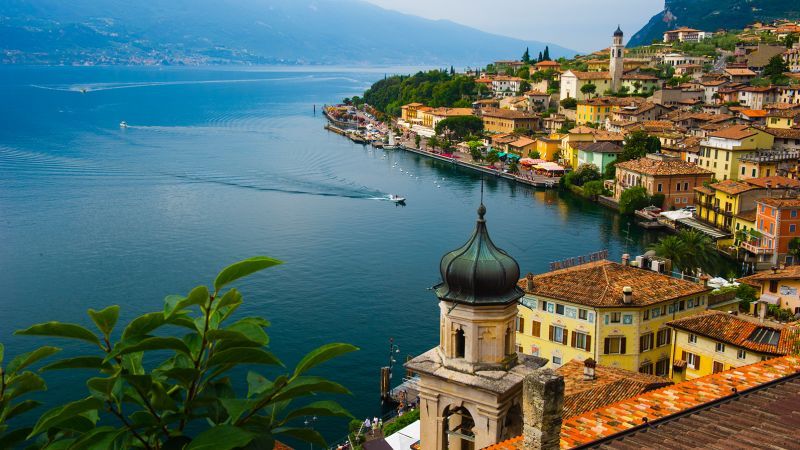Editor's note: All-new episodes of “Stanley Tucci: Searching for Italy” air Sundays at 9 p.m. ET, only on CNN. Missed a week? Catch up with CNNgo. You can also watch the first season on Discovery+.
cnn
—
It's a place with terraced lemon trees, a paradoxically warm mountain breeze, and a powerful fat-killing gene carried by a few lucky residents.
Limone sul Garda, a picturesque fishing village on the shores of Lake Garda in the Lombardy region of northern Italy, is an unusual destination with just over 1,000 residents.
It is the northernmost place in the world where lemons are grown naturally and has an exceptionally mild climate, considering its location at the foot of the Alps.
Perhaps this combination of factors is what has led the village to claim that it has a secret “elixir” for a long and healthy life.
Many locals have apparently been blessed with great digestive abilities that allow them to gorge on cream-filled pastries and greasy sausages without worrying about expanding waistlines or heart problems.
These residents have what they call the “Limone gene,” which contains a special protein that destroys lipids and keeps blood fluid.
For 40 years, the population of Limone sul Garda has been under scientific observation, and villagers carrying the genes were tested like laboratory rats.
Of the 1,000 residents, half were born and raised in Limone; and of those 500, 60 have the gene.
“The gene runs in the family,” says merchant Gianni Segala, who jokes that villagers are used as “blood bags” for scientists.
“My brothers and I, my mother (who is 96 years old and still very intelligent) and all my children take it.
“Since the 80s we have donated our blood for periodic tests and almost bled to death completely,” he adds ironically.
He remembers the first time doctors made him swallow a sugary dose of whipped cream every two hours to monitor his blood.
“They took my blood after every bite, it was so sweet and fatty that I felt nauseous, but even though I ate a lot my blood instantly destroyed the fats without assimilating them. When night fell I almost fainted [due to blood loss],” he says.
However, while people like Segala may never have to worry about clogged veins and blood clots, he says he lives a very normal life and is “not a Superman.”
Cesare Sirtori, professor of clinical pharmacology at the Università degli Studi di Milano, leads the team that first identified what Limone locals call the “elixir” protein, calling it A-1 Milano. He says Limone people have exceptionally low HDL cholesterol levels (in the range of 7 to 15 when it should normally be 40 to 60), which appears to be the result of a genetic mutation within the carrier protein.
“Having low HDL cholesterol, since it is classified as 'good' cholesterol, is bad for health and causes heart problems such as possible strokes, but in this population it has a reverse positive effect,” he says.
“And although 99% of genetic protein mutations trigger diseases and pathologies, this has determined the absence of vascular diseases in carriers.” Sirtori is now studying the Limone gene to see how it could promote the fight against atherosclerosis.
In 2000, he and his team synthesized the Limone protein in the laboratory and injected it into rabbits. The animals saw a significant decrease in blood clots in their arteries.
He discovered that in Limone it is a dominant gene, found in the DNA of five-year-old children, young and old alike.

The gene was first identified in the blood of a train driver from Limone, Segala's ancestor, who had been involved in an accident in Milan (hence the name of the protein A-1 Milano) and was taken to hospital. The doctors who cured him were baffled by the surprising results of his blood and began a mass screening campaign in the town.
“I was just a child when I had my blood tested for the first time and the doctors come regularly to monitor the behavior of our gene,” says Giuliano Segala, Gianni's son.
“The fact that I carry [the gene] “It gives me a kind of life insurance: I feel more protected from a health perspective and confident that I won't have clogged arteries or die of a heart attack when I get older.”
Although he sometimes feels like a guinea pig, Giuliano, who is slim and fit, admits to happily enjoying fatty sausages, such as mortadella, salami and even lard, as does his grandmother, who takes care of herself and cooks for the whole family. The young Segalas inherited the gene from her.
“My stomach never hurts and I eat whatever I want. Love cotolette (breaded and fried veal cutlets), fried foods, salamis and I also love to drink. “I sleep like a baby,” says Giuliano. But just because you carry this excellent gene doesn't mean you always overeat. He also exercises regularly and walks with his father along mountain peaks to enjoy spectacular views of nearby Lake Garda.
Sirtori still hopes to analyze what happens if two carriers conceive a child. Until now, it was the father or mother of the carrier who passed on the gene.

Sirtori says this genetic mutation, and its associated health benefits, is unique to Limone and cannot even be found in nearby villages. However, he is not interested in delving into the reason.
But others do. Antonio Girardi, a local hotelier who has traced the entire family tree of Limone gene transmission back to the 18th century, believes environment, climate and natural products play a key role.
“This climate can be warm all year round; we never have snow or ice, and that's also why lemons have been growing in this northern area for centuries,” he says.
“Or maybe it's thanks to the extraordinary extra virgin olive oil we're all weaned on and the fresh lake fish we eat.”
Since the Renaissance, wealthy families have flocked to the shores of Limone to spend their holidays, breathing in the sweet alpine air mixed with citrus fragrances and benefiting from the climate.
Girardi maintains a phone book with the contacts of all gene carriers over 60 years old. The other residents are divided between those born in Limone and those from neighboring cities or abroad, attracted by the paradisiacal surroundings and the sleepy atmosphere of Limone's labyrinth of cobblestone alleys, corridors and white houses.
In the past, the villagers were fishermen or mountain loggers who transported logs on donkeys to sell to ships in the port. Today everyone works in the tourism sector, which generates a lot of money.
Families stroll through the picturesque harbor and tourists visit the fishing museum. The inviting beaches attract sunbathers and boaters in summer, while hikers explore the high cliffs that loom over the lake.
“These mountains act as natural shields that protect us from cold winds and capture the sun, keeping temperatures consistently warm,” says Girardi.
“We must be grateful for this pleasant and extraordinary microclimate that has given our people such a natural elixir.”
• Subscribe to CNN Travel's free nine-part show Unlock Italy Newsletter for insider information on Italy's most beloved destinations and lesser-known regions to plan your best trip. Plus, we'll get you in the mood before you go with movie suggestions, reading lists, and Stanley Tucci recipes.











